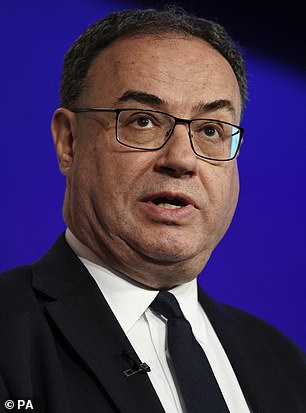
Under pressure: Andrew Bailey
Testing days lie ahead for Andrew Bailey and the Bank of England. Halfway through his eight-year term as governor of the central bank, his homework is about to be marked.
At the behest of the Court, the Bank’s supervisory board, the former chairman of the US Federal Reserve Ben Bernanke will shortly deliver his report on the Bank’s faulty forecasting record and how it might be improved.
No-one should expect this to be a barrel of laughs.
Bernanke is a Nobel prize winning economist and there is certain to be a great deal of technical mumbo-jumbo about forecasting models.
Bailey and the Bank might also shortly face some more arrows from Britain’s political Right, with former prime minister Liz Truss alleging publicly that the Bank is part of a ‘deep state’ which contributed to her downfall.
Many criticisms of the Bank’s operations have been well aired. It stuck far too long to its belief that the jump in inflation from 2021 onwards, rising to a peak of 11.1 per cent in late 2022, was transitional.
It was slow to recognise the danger – the Bank was not alone in that among G7 countries – but Chile, Norway and Brazil acted earlier to head off danger.
More damaging was the decision to keep on printing money through quantitative easing, against the advice of former chief economist Andy Haldane.
Forecasting of both inflation and output have been so off the mark as to be risible.
If the forecasts had been correct, the UK would be in the midst of its longest recession in history.
There was a short technical recession in the second half of 2023 after interest rates had been hiked to 5.25 per cent.
Most of the current survey data suggests that recovery, albeit slow, is under way with both manufacturing and construction supporting a buoyant services sector.
Communications by the Bank’s top brass often have been faulty. In the middle of a cost of living crisis, Bailey called pay rises ‘unsustainable’.
The well-paid governor was suggesting that everyone else had to be poorer. Haldane’s successor as chief economist, Huw Pill, unsentimentally suggested people had to accept they would be less well off because of the energy price shock. There has been much more.
As a long-time observer of Bailey in several roles, among his shortcomings is a tendency, in the interest of openness, to think out loud. This makes him gaffe prone.
Colleagues inside the Bank unkindly have reported a tendency to drop off during meetings. The ‘sexy turtle,’ as predecessor Mark Carney called him, has earned the unkind sobriquet, according The Economist, of ‘Rock-a-bye Bailey.’
Not surprising, perhaps, given the several ‘all-nighters’ he has put in as successive shocks hit the economy.
What will Bernanke propose? Chancellor Jeremy Hunt is embracing the notion of AI and tech to speed up the NHS. The suggestion is that the Bank could do with an IT overhaul which would enable it to include many more variables in its forecasting.
The current Bank model, known as Compass, is limited in its scope and primarily focused on output.
Many of the variables it uses come from the age of great stability before the brutal shocks of the last two decades, such as the great financial crisis, pandemic and Russia’s war on Ukraine.
The other great lacuna is ‘group think’. Most insiders on the interest rate setting Monetary Policy Committee (MPC) are drawn from similar backgrounds, with several having worked at or closely with the Treasury. The external members do tend to show more wit and variety of views, notably on the lags – delays in effectiveness – of monetary policy.
But when push comes to shove, decision-making is largely dependent on the Bank’s faulty modelling.
Contrast this with the US where the dozen presidents of the regional Feds have access to their own forecasting units and models bringing a different wisdom to the table which the Fed incorporates in its projections.
Britain may not lend itself to such an approach. Nevertheless, a more diverse MPC, armed with different forecasts and opinions, would hugely improve the credibility and reliability of decisions.




